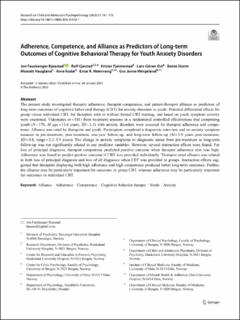Adherence, Competence, and Alliance as Predictors of Long-term Outcomes of Cognitive Behavioral Therapy for Youth Anxiety Disorders
Bjaastad, Jon Fauskanger; Gjestad, Rolf; Fjermestad, Krister Westlye; Öst, Lars Gøran; Haugland, Bente Storm Mowatt; Kodal, Arne; Heiervang, Einar Røshol; Wergeland, Gro Janne Henningsen
Journal article, Peer reviewed
Published version

Åpne
Permanent lenke
https://hdl.handle.net/11250/3084810Utgivelsesdato
2023Metadata
Vis full innførselSamlinger
- Department of Clinical Medicine [2066]
- Registrations from Cristin [9791]
Originalversjon
Research on Child and Adolescent Psychopathology. 2023, 51, 761-773. 10.1007/s10802-023-01028-1Sammendrag
The present study investigated therapist adherence, therapist competence, and patient-therapist alliance as predictors of long-term outcomes of cognitive behavioral therapy (CBT) for anxiety disorders in youth. Potential differential effects for group versus individual CBT, for therapists with or without formal CBT training, and based on youth symptom severity were examined. Videotapes (n = 181) from treatment sessions in a randomized controlled effectiveness trial comprising youth (N = 170, M age = 11.6 years, SD = 2.1) with anxiety disorders were assessed for therapist adherence and competence. Alliance was rated by therapists and youth. Participants completed a diagnostic interview and an anxiety symptom measure at pre-treatment, post-treatment, one-year follow-up, and long-term follow-up (M = 3.9 years post-treatment, SD = 0.8, range = 2.2–5.9 years). The change in anxiety symptoms or diagnostic status from pre-treatment to long-term follow-up was not significantly related to any predictor variables. However, several interaction effects were found. For loss of principal diagnosis, therapist competence predicted positive outcome when therapist adherence also was high. Adherence was found to predict positive outcome if CBT was provided individually. Therapist-rated alliance was related to both loss of principal diagnosis and loss of all diagnoses when CBT was provided in groups. Interaction effects suggested that therapists displaying both high adherence and high competence produced better long-term outcomes. Further, the alliance may be particularly important for outcomes in group CBT, whereas adherence may be particularly important for outcomes in individual CBT.
